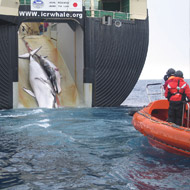
More than 300 minke whales slaughtered in the name of science
Animal protection advocates are calling for an end to the cruel practice of whale harpooning, after vessels containing the meat and blubber from more than 300 minke whales docked in Japan.
The four-vessel fleet docked on Friday (31 March) in Shimonoseki on its return from its controversial ‘scientific whaling’ in the Southern Ocean. Destined for the Japanese marketplace, the meat was frozen and pre-packed, ready for sale.
The number of whales killed is the full quota that Japan has assigned itself under NEWREP-A - a whaling programme that is set to run until 2027. One of the main aims of the programme is to collect data, which Japan claims will improve biological information on Antarctic minke whales and the marine ecosystem.
But there is no humane way to kill such large mammals, and whalers are using barbaric methods - such as exploding harpoons - to chase them down. Most whales targeted by this method do not die immediately and can take considerable time to die.
In a statement, Kitty Black, executive vice president of Human Society International (HSI), described the practice as ‘obscene cruelty in the name of science that must end’.
“There is no robust scientific case for slaughtering whales,” she said. “Commercial whaling in this or any disguise does not meet any pressing human needs and should be relegated to the annals of history.”
It is thought that more than 15,000 whales have been killed by Japan since 1982 when a ban on commercial hunting was introduced. Under Article VIII of the International Convention for the Regulation of Whaling, Japan is permitted to kill the animals in the name of science. But it is widely accepted that this is only a pretext for an ongoing commercial hunt.
In January, EU member states signed a formal statement of concern over the NEWREP-A programme. Meanwhile, members of the US Congress are set to condemn the killing, with a resolution due to be introduced calling for an end to Japanese whaling.
Te resolution urges Japan to cease all whaling and affirms the commitment of the U.S government to protect whales.
Image (C) Australian Customs and Border Protections Service.



 The BSAVA has opened submissions for the BSAVA Clinical Research Abstracts 2026.
The BSAVA has opened submissions for the BSAVA Clinical Research Abstracts 2026.